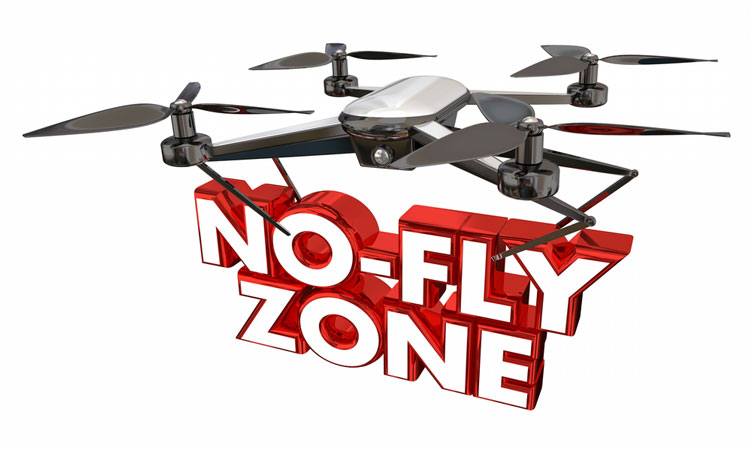UK government extends drone ‘no-fly’ zone around airfields
- Like
- Digg
- Del
- Tumblr
- VKontakte
- Buffer
- Love This
- Odnoklassniki
- Meneame
- Blogger
- Amazon
- Yahoo Mail
- Gmail
- AOL
- Newsvine
- HackerNews
- Evernote
- MySpace
- Mail.ru
- Viadeo
- Line
- Comments
- Yummly
- SMS
- Viber
- Telegram
- Subscribe
- Skype
- Facebook Messenger
- Kakao
- LiveJournal
- Yammer
- Edgar
- Fintel
- Mix
- Instapaper
- Copy Link
Posted: 20 February 2019 | International Airport Review | No comments yet
The UK government has extended the drone ‘no-fly’ zone around airports from one kilometre to five kilometres and will introduce a stop and search policy for people suspected of using drones maliciously.


Following the new laws in 2018 restricting the use of drones and bringing forward a new drone-users register, the government has announced new legislation to extend the ‘no-fly’ zone around airports, banning drones from flying within five kilometres of runways.
The enlarged zone will better protect the UK’s airports from those misusing drones and will come into force on the 13 March 2019.
The Transport Secretary, Chris Grayling, said: “The law is clear that flying a drone near an airport is a serious criminal act. We’re now going even further and extending the ‘no-fly’ zone to help keep our airports secure and our skies safe.”
A new Drones Bill (currently underway) will also give police officers the power to stop and search people suspected of using drones maliciously above 400ft or within five kilometres of an airport – helping them to tackle disruption such as that seen at Gatwick in December 2018. It will also give additional new powers to the police to clamp down on those misusing drones and other small unmanned aircraft in general – including the power to access electronic data stored on a drone with a warrant.
Grayling commented: “Anyone flying their drone within the vicinity of an airport should know they are not only acting irresponsibly, but criminally, and could face imprisonment.”
The Home Secretary, Sajid Javid, said: “Extending stop and search to include drones will help police tackle disruption like the recent misery we saw at UK airports, when travel was ruined for thousands of innocent passengers, and bring those responsible to justice. Police are clear that stop and search is one of the most powerful tools they have to target and disrupt crime and I remain committed to giving them all the support they need to protect the public.”
The UK government and the Civil Aviation Authority (CAA) have also announced a new partnership with the retailer Jessops, as part of a national campaign to increase public awareness of the rules around flying drones. Working with the CAA, the government is running a campaign to help educate the public about responsible drone use, including issuing a digital toolkit to airports to help them raise awareness of the new rules.
Ian Savage, Head of Retail and Academy Training at Jessops, said: “Drones are one of the most exciting ways of capturing stunning aerial photos and videos, and with prices more affordable than ever they are within reach of any budding photographer and videographer. Many are intuitive and simple to operate, making them ideal for beginners, while the more sophisticated models now offer features such as full manual control of the camera and stunning 4K 60fps video, that help advanced photographers take their shots to the next level.
“Along with the pleasure drones bring comes a responsibility for the user to ensure they are flying their drone safely and legally. As one of the leading drone retailers Jessops is committed to ensuring it communicates the new laws to all its customers, and it will be doing this through extensive training from our dedicated drone specialists Connor Keenan and Jon Dick.”
Tim Johnson, Policy Director at the CAA, said: “It is illegal to fly drones close to airports and anyone flouting the rules can face severe penalties including imprisonment. Anyone operating a drone must do so responsibly and observe all relevant rules and regulations. The rules for flying drones are designed to keep all airspace users safe. The CAA’s Dronecode provides advice on how to fly your drone safely and follow the rules.”
The Home Office is also reviewing the UK’s approach to countering the malicious use of drones and will consider how best to protect the full range of the UK’s critical national infrastructure – including testing and evaluating technology to counter drones.
Related topics
Related organisations
Civil Aviation Authority (CAA), Department for Transport (DfT), Jessops, The Home Office
Related regions
Related people
Chris Grayling, Connor Keenan, Ian Savage, Jon Dick, Sajid Javid, Tim Johnson

















